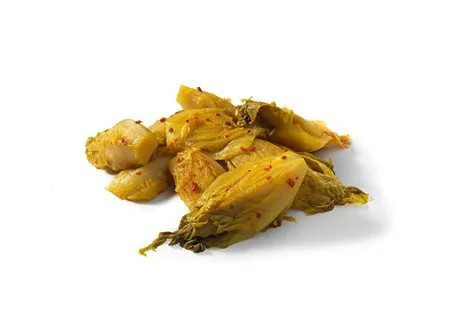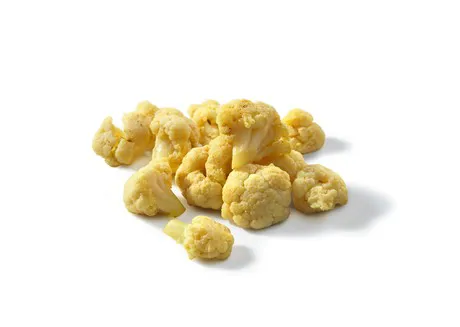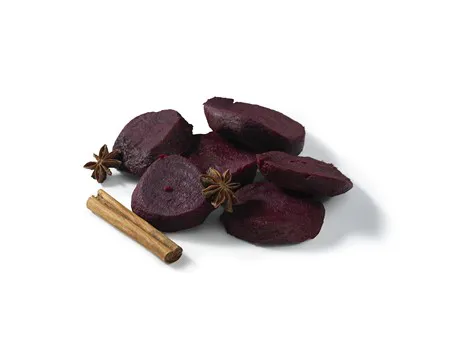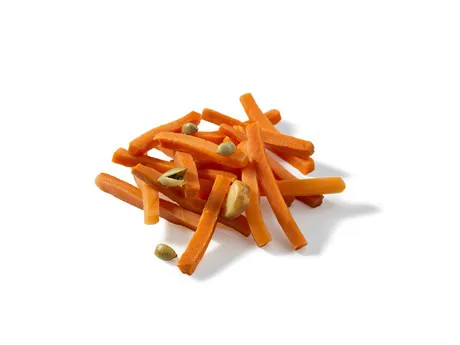Verstegen Spices & Sauces is introducing a new innovation for the fresh produce sector - fermented vegetables. The 133-year old family company has always focused on flavour, functionality and sustainability. They’re now entering the market of processed fresh fruit and vegetables in cooperation with the fresh produce sector. By means of fermentation and organic mild vinegars, they’re now marketing four fermented vegetables for the professional market.

Fermented Little Jam
Adding new values
This process is unique because the right lactic acid bacterium turns the natural sugar in the vegetables into fresh and sour notes with a unique flavour. Fermentation is also suitable for processing waste flow  fruit and vegetables. This way, Verstegen adds new values without losing the other valuable characteristics of vegetables, such as texture, colour, bite and vitamins. They get a unique new flavour and an extended shelf life. Fermented vegetables are therefore healthy and sustainable. These themes are very current and respond to the trends of today.
fruit and vegetables. This way, Verstegen adds new values without losing the other valuable characteristics of vegetables, such as texture, colour, bite and vitamins. They get a unique new flavour and an extended shelf life. Fermented vegetables are therefore healthy and sustainable. These themes are very current and respond to the trends of today.
Jeroen van der Graaf
Fermented means living microorganisms (lactic acid bacteria) change the food in a controlled manner at the right temperature. Verstegen was faced with quite a challenge, because fermentation can also result in disadvantageous bacteria, moulds and/or yeasts. After more than a year of research, Verstegen found the solution to guarantee food safety by means of the right technique and recipe. “When doing it in a controlled manner, good characteristics are created. It’s a process you should cherish and nurture,” says Jeroen van de Graaf, creative innovation manager for Verstegen. Five years ago, he became acquainted with the technique in Korea, where fermentation processes are used a lot, for soy sauce, miso and kimchi for example, and that’s where he discovered the many favourable effects of fermentation. Besides the fact that it extends the shelf life of the product and adds flavour and aroma, the food becomes better digestible and it results in a very healthy product that contains lots of antioxidants and probiotics, which are good for intestinal flora and have a positive effect on digestion. Jeroen saw a big future in fermentation for Verstegen. After an innovation meeting with manager and owner Michel Driessen, a pitch about the idea followed within the company, and a short while later, a complete processing plant had become a fact. Fermented orange carrots, beets, cauliflower, little gem and mustard seed have now been marketed.

Fermented cauli flower
Two major challenges
According to Jeroen, fermentation has two major challenges. Retaining the added values of fresh vegetables, such as texture, colour and nutrients, and marketing the product as food safe. As a specialist in creating flavour, Verstegen has 133 years of knowledge and experience, and it was a perfect addition to the company in this field.
During fermentation, the vegetables are mixed with salt, herbs and spices and mild vinegars. Herbs and spices add a lot of flavour during fermentation through infusion. The acid results in a reduction of pH values, so that only the favourable microorganisms are given the chance to develop, and not the disadvantageous ones. As acid components, Verstegen uses Ediks, an organic, mild and flavourful vinegar they personally produce. By using Ediks, less salt is needed compared to other fermentations, which is good for health. Besides, Verstegen uses food paring to find the right combinations between herbs and vegetables on a molecular level. “Umami is created during the process, and that results in a unique and rich flavour profile. Flavours that can make your professional heart beat faster,” Verstegen promises.

Fermented Beetroot
Fermentation therefore uses ‘the trick of the trade,’ the added ingredients and the duration of the process are decisive. Jeroen: “It’s very precise work. Verstegen only works with original spices.”
Verstegen started with four fermented vegetable products: orange carrot (with green cardamom, fresh ginger, apple butter edik), beetroot (cinnamon, star anise, orange edik), cauliflower florets (Ras el Hanout, Pedro Zimenes edik) and little gem (turmeric, chili, paprika, lemongrass ginger / ginger edik). These vegetables can be used in many ways, such as raw processing, stir-frying, grilling, steaming, baking and mashing. Although Verstegen is active on both the food service and the consumer market, they’ve chosen to sell the product on the food service market first. Verstegen knows from experience that new concepts have the biggest chance of being successful in food service, before being marketed on the industry and consumer market. These last two markets require a different target audience approach. “Verstegen also provides various inspiring master classes for chefs, so we can explain the innovations by means of a combination of theory, cooking and tasting. The chefs are often the first to be open to new trends, and they have the creative ability to get started with the products,” Jeroen explains.

Fermented carrots
The first four vegetable varieties are now marketed under the LegHumes name, and “it’s going incredibly well,” Jeroen says. But he wouldn’t be doing his job if he didn’t already have some new plans. Jeroen: “We’re testing multiple fermented vegetable varieties, such as parsnip and celeriac, heirloom carrot and Jerusalem artichoke. Fruit can also be fermented, apple, banana, pineapple, we’re seeing opportunities for fruit bowls and the like. But waste flows, such as the greens and leaves of vegetables or B-class, are very suitable for fermentation.” There are plenty of options for this new link in the supply chain.
Voor meer informatie Verstegen Spices&Sauces
Verstegen Spices&Sauces
Industrieweg 161
3044 AS Rotterdam
T: +31 (0)10 245 5100
mvanoord@verstegen.nl
www.verstegen.eu
